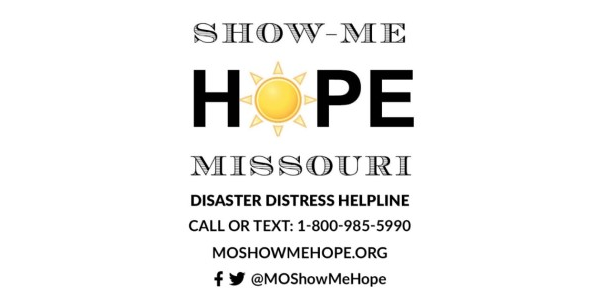Yes, 2021 Is Coming, but We've Got This!
- Written by Susan Flanigan, CBCP

I’m simultaneously exhausted and hopeful to see January 1, 2021.
True, the New Year won’t change this reality: the pandemic continues, along with grief from losing family and friends, unemployment, housing and food instability, social justice impacts and other societal challenges. Exhaustion is everywhere and so is anxiety, stress and uncertainty.
Still, I’m choosing to be hopeful for 2021.
The good news is the Show-Me Hope Crisis Counseling Program can help Missourians navigate the holidays and 2021. This free, confidential, multilingual service is delivered through Missouri’s Coalition of Community Behavioral Health Centers and administered by the Department of Mental Health with Federal Emergency Management Agency funding.
Statewide Show-Me Hope crisis counselors will listen to your concerns, share coping and stress management tips, and connect you to local resources. Connect with Show Me Hope 24/7 by calling or texting 800/985-5990.
As we move through the holidays into 2021, here are my tips on how to stay healthy and balanced.
Reflecting. My parents are gone, but not my memories and lessons learned from them. My mother was an optimist with this mantra, “Nothing is constant but change.” Depression, (both the 1930s and the condition), influenced my father’s point of view. To Dad, not only was the glass half empty, but it was cracked and belonged to someone else. Our rural Missouri family wasn’t perfect, but we were always there for each other during difficult times - illness, car wrecks, divorce, death, and behavioral health crises. The bad times didn’t last and, obviously, neither did the good times. Nothing is constant but change is my foundation for resilience and hope. It will get better.
Supporting & Celebrating. Technology keeps me close to my family and friends, regardless of location. Our Zoom calls and shared playlists foster laughter and virtual hugs across all time zones. Here in STL, the socially distanced hikes and fire pit chats connect us outside and emotionally. Both allow time to share and listen. Of course everyone is stressed, and heartaches continue: loss of a child to opioids, death of an elderly parent due to social isolation, siblings with cancer, and the ever-present COVID19. But the good news continues as well: healthy babies arrive, weddings take place, retirements occur and career opportunities surface. Who in your life needs your ear to hear their story? Make a list of people to contact to offer emotional support or celebrate milestones. Then take 5 minutes to connect.
Prioritizing emotional wellness. Having worked in disaster response for 27 years, I am the “go to” for crises among family and friends in addition to my public service role. This pandemic is our unified Ground Hog Day. The relentless slog of the pandemic and the increasing stress upon every living being (even pets feel stress) is beyond palpable. I’ve set boundaries and expectations both personally and professionally. Unequivocally, I’ve promoted self-care and stress management. But you’ve got to practice what you preach. To everyone who says, “I can’t take time off! Who will do the work?” I counter with you can start with five minutes to stand up and get away from your work environment to get fresh air, listen to music or call/text your favorite person. Stress can build until there is no place to go but a physical or emotional eruption.
Being patient and kind to everyone. As a system, we’re asked, “Can Mental Health help us out here?” Sure we can, to a degree. However, every citizen needs to learn coping skills and every school, business, organization, place of worship, and community needs to assess if they are providing a behavioral healthy environment for those entrusted to them. Compassion fatigue is real and impacting our mental health professionals, healthcare workers, first responders, teachers, retail and delivery workers, faith community and, yes, basically everyone. Be kind, practice patience, and remember we all need to be the bigger person. Model the behavior you want to see. It really is as basic as the Golden Rule: treat people the way you want to be treated.
Here’s what you can do:
- Put 800/985-5990 in your phone and share it. This Show-Me Hope Helpline is free, confidential and multilingual. Connect 24/7 via text or call to licensed mental health worker to discuss your concerns and connect to local services, if needed.
- Visit Show-Me Hope to find the location near you.
- Call, text, email or send a snail mail note to someone you are thinking about right now. Who is that person that you’d like to connect with to see how they are doing?
Yes, 2021 is coming but we’ve got this.
Know that hope is with us.
It will get better.
Remember, nothing is constant but change.
About the Author
 Susan Flanigan, CBCP, the Legislative Liaison and Director of Disaster Services for the Missouri Department of Mental Health (DMH), lives in the City of St. Louis.
Susan Flanigan, CBCP, the Legislative Liaison and Director of Disaster Services for the Missouri Department of Mental Health (DMH), lives in the City of St. Louis.






















